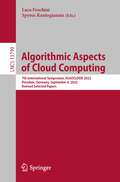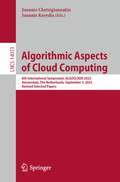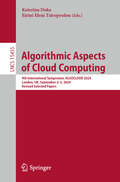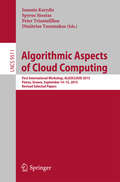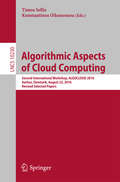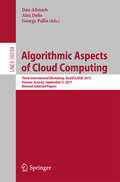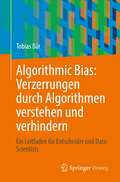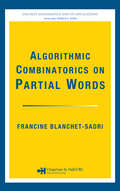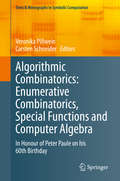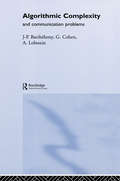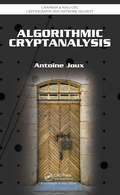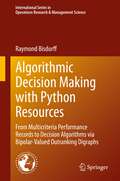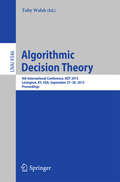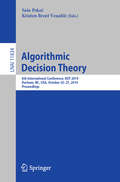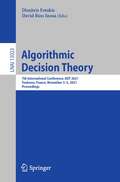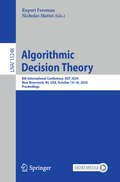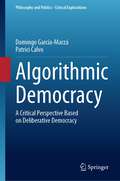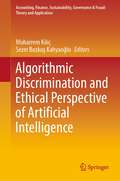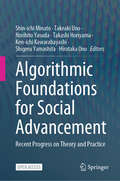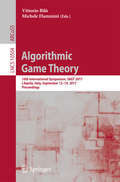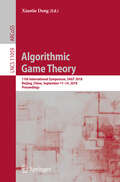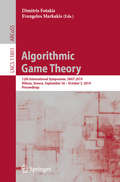- Table View
- List View
Algorithmic Aspects of Cloud Computing: 7th International Symposium, ALGOCLOUD 2022, Potsdam, Germany, September 6, 2022, Revised Selected Papers (Lecture Notes in Computer Science #13799)
by Spyros Kontogiannis Luca FoschiniThis book constitutes revised selected papers from the refereed proceedings of the 7th International Symposium on Algorithmic Aspects of Cloud Computing, ALGOCLOUD 2022, which took place in Potsdam, Germany, on September 6, 2022.The 6 full papers included in this book were carefully reviewed and selected from 16 submissions. They were organized in topical sections as follows: Cloud-Based Urban Mobility Services; New Results in Priority-Based Bin Packing; More Sparking Soundex-based Privacy-Preserving Record Linkage and Privacy Preserving Queries of Shortest Path Distances.
Algorithmic Aspects of Cloud Computing: 8th International Symposium, ALGOCLOUD 2023, Amsterdam, The Netherlands, September 5, 2023, Revised Selected Papers (Lecture Notes in Computer Science #14053)
by Ioannis Karydis Ioannis ChatzigiannakisThis book constitutes revised selected papers from the 8th International Symposium on Algorithmic Aspects of Cloud Computing, ALGOCLOUD 2023, held in Amsterdam, The Netherlands, on September 5, 2023. The 13 full papers included in this book were carefully reviewed and selected from 24 submissions. They focus on algorithmic aspects of computing and data management in modern cloud-based systems interpreted broadly so as to include edge- and fog-based systems, cloudlets, cloud micro-services, virtualization environments, decentralized systems, as well as dynamic networks.
Algorithmic Aspects of Cloud Computing: 9th International Symposium, ALGOCLOUD 2024, London, UK, September 2–3, 2024, Revised Selected Papers (Lecture Notes in Computer Science #15455)
by Katerina Doka Eirini Eleni TsiropoulouThis book constitutes the refereed proceedings of the 9th International Symposium on Algorithmic Aspects of Cloud Computing, ALGOCLOUD 2024, held in London, UK, during September 2024. The 9 full papers and 1 short paper presented here were carefully reviewed and selected from 18 submissions.They focus on various topics in the emerging area of algorithmic aspects of Computing and data management in modern Cloud-based systems.
Algorithmic Aspects of Cloud Computing: First International Workshop, ALGOCLOUD 2015, Patras, Greece, September 14-15, 2015. Revised Selected Papers (Lecture Notes in Computer Science #9511)
by Peter Triantafillou Ioannis Karydis Spyros Sioutas Dimitrios TsoumakosThis book constitutes the thoroughly refereedpost-conference proceedings of the First International Workshop on AlgorithmicAspects of Cloud Computing, ALGOCLOUD 2015, held in Patras, Greece, inSeptember 2015 in conjunction with ALGO 2015. The 13 revised full papers presented together with 2tutorial papers were carefully reviewed and selected from 37 initialsubmissions. They cover a wide range of topics in two main tracks: algorithmicaspects of large-scale data stores, and software tools and distributedarchitectures for cloud-based data management.
Algorithmic Aspects of Cloud Computing: Second International Workshop, ALGOCLOUD 2016, Aarhus, Denmark, August 22, 2016, Revised Selected Papers (Lecture Notes in Computer Science #10230)
by Timos Sellis Konstantinos OikonomouThis book constitutes the thoroughly refereed post-conference proceedings of the Second International Workshop on Algorithmic Aspects of Cloud Computing, ALGOCLOUD 2016, held in Aarhus, Denmark, in August 2016. The 11 revised full papers presented together with one tutorial paper were carefully reviewed and selected from 30 initial submissions. They deal with the following topics: algorithmic aspects of elasticity and scalability for distributed, large-scale data stores (e. g. NoSQL and columnar databases); search and retrieval algorithms for cloud infrastructures; monitoring and analysis of elasticity for virtualized environments; NoSQL, schemaless data modeling, integration; caching and load-balancing; storage structures and indexing for cloud databases; new algorithmic aspects of parallel and distributed computing for cloud applications; scalable machine learning, analytics and data science; high availability, reliability, failover; transactional models and algorithms for cloud databases; query languages and processing programming models; consistency, replication and partitioning CAP, data structures and algorithms for eventually consistent stores.
Algorithmic Aspects of Cloud Computing: Third International Workshop, ALGOCLOUD 2017, Vienna, Austria, September 5, 2017, Revised Selected Papers (Lecture Notes in Computer Science #10739)
by Dan Alistarh Alex Delis George PallisThis book constitutes the thoroughly refereed post-conference proceedings of the Second International Workshop on Algorithmic Aspects of Cloud Computing, ALGOCLOUD 2017, held in Vienna, Austria, in September 2017. The 9 revised full papers were carefully reviewed and selected from 27 submissions. The aim of the workshop is to present research activities and results on topics related to algorithmic, design, and development aspects of modern cloud-based systems.
Algorithmic Aspects of Machine Learning
by Ankur MoitraThis book bridges theoretical computer science and machine learning by exploring what the two sides can teach each other. It emphasizes the need for flexible, tractable models that better capture not what makes machine learning hard, but what makes it easy. Theoretical computer scientists will be introduced to important models in machine learning and to the main questions within the field. Machine learning researchers will be introduced to cutting-edge research in an accessible format, and gain familiarity with a modern, algorithmic toolkit, including the method of moments, tensor decompositions and convex programming relaxations. The treatment beyond worst-case analysis is to build a rigorous understanding about the approaches used in practice and to facilitate the discovery of exciting, new ways to solve important long-standing problems.
Algorithmic Bias: Ein Leitfaden für Entscheider und Data Scientists
by Tobias BärSind Algorithmen Freund oder Feind?Der menschliche Verstand ist evolutionär darauf ausgelegt, Abkürzungen zu nehmen, um zu überleben. Wir ziehen voreilige Schlüsse, weil unser Gehirn uns in Sicherheit wiegen will. Die meisten unserer Voreingenommenheiten wirken sich zu unseren Gunsten aus, z. B. wenn wir ein Auto, das in unsere Richtung fährt, für gefährlich halten und sofort ausweichen oder wenn wir beschließen, einen Bissen Essen nicht zu essen, der verdorben zu sein scheint. Allerdings wirken sich inhärente Vorurteile negativ auf das Arbeitsumfeld und die Entscheidungsfindung in unseren Gemeinschaften aus. Zwar wird mit der Entwicklung von Algorithmen und maschinellem Lernen versucht, Voreingenommenheit zu beseitigen, doch werden sie schließlich von Menschen geschaffen und sind daher anfällig für das, was wir algorithmische Voreingenommenheit nennen.In Understand, Manage, and Prevent Algorithmic Bias (Algorithmische Voreingenommenheit verstehen, handhaben und verhindern) hilft Ihnen der Autor Tobias Baer zu verstehen, woher algorithmische Voreingenommenheit kommt, wie man sie als Geschäftsanwender oder Regulierungsbehörde handhaben kann und wie die Datenwissenschaft verhindern kann, dass Voreingenommenheit in statistische Algorithmen einfließt. Baer befasst sich fachkundig mit einigen der mehr als 100 Arten natürlicher Verzerrungen wie Confirmation Bias, Stability Bias, Pattern Recognition Bias und vielen anderen. Algorithmische Verzerrungen spiegeln diese menschlichen Tendenzen wider und haben ihren Ursprung in ihnen. Baer befasst sich mit so unterschiedlichen Themen wie der Erkennung von Anomalien, hybriden Modellstrukturen und selbstverbesserndem maschinellen Lernen.Während sich die meisten Schriften über algorithmische Voreingenommenheit auf die Gefahren konzentrieren, weist der Kern dieses positiven, unterhaltsamen Buches auf einen Weg hin, auf dem Voreingenommenheit in Schach gehalten und sogar beseitigt werden kann. Sie erhalten Managementtechniken, um unvoreingenommene Algorithmen zu entwickeln, die Fähigkeit, Voreingenommenheit schneller zu erkennen, und das Wissen, um unvoreingenommene Daten zu erstellen. Algorithmic Bias verstehen, verwalten und verhindern ist ein innovatives, zeitgemäßes und wichtiges Buch, das in Ihr Regal gehört. Egal, ob Sie eine erfahrene Führungskraft in der Wirtschaft, ein Datenwissenschaftler oder einfach nur ein Enthusiast sind, jetzt ist ein entscheidender Zeitpunkt, um sich über die Auswirkungen algorithmischer Verzerrungen auf die Gesellschaft zu informieren und eine aktive Rolle im Kampf gegen Verzerrungen zu übernehmen.Was Sie lernen werdenUntersuchung der vielen Quellen algorithmischer Verzerrungen, einschließlich kognitiver Verzerrungen in der realen Welt, verzerrter Daten und statistischer ArtefakteVerstehen Sie die Risiken algorithmischer Verzerrungen, wie sie erkannt werden können und welche Managementtechniken es gibt, um sie zu verhindern oder zu verwaltenErkennen, wie maschinelles Lernen sowohl neue Quellen für algorithmische Verzerrungen schafft als auch ein Teil der Lösung sein kannKenntnis spezifischer statistischer Techniken, die ein Datenwissenschaftler anwenden kann, um algorithmische Verzerrungen zu erkennen und zu beseitigenFür wen dieses Buch gedacht istFührungskräfte von Unternehmen, die Algorithmen im täglichen Betrieb einsetzen; Datenwissenschaftler (von Studenten bis hin zu erfahrenen Praktikern), die Algorithmen entwickeln; Compliance-Beamte, die über algorithmische Verzerrungen besorgt sind; Politiker, Journalisten und Philosophen, die über algorithmische Verzerrungen im Hinblick auf ihre Auswirkungen auf die Gesellschaft und mögliche regulatorische Maßnahmen nachdenken; und Verbraucher, die darüber besorgt sind, wie sie von algorithmischen Verzerrungen betroffen sein könnten
Algorithmic Combinatorics on Partial Words
by Francine Blanchet-SadriThe discrete mathematics and theoretical computer science communities have recently witnessed explosive growth in the area of algorithmic combinatorics on words. The next generation of research on combinatorics of partial words promises to have a substantial impact on molecular biology, nanotechnology, data communication, and DNA computing. Delving
Algorithmic Combinatorics: In Honour of Peter Paule on his 60th Birthday (Texts & Monographs in Symbolic Computation)
by Carsten Schneider Veronika PillweinThe book is centered around the research areas of combinatorics, special functions, and computer algebra. What these research fields share is that many of their outstanding results do not only have applications in Mathematics, but also other disciplines, such as computer science, physics, chemistry, etc. A particular charm of these areas is how they interact and influence one another. For instance, combinatorial or special functions' techniques have motivated the development of new symbolic algorithms. In particular, first proofs of challenging problems in combinatorics and special functions were derived by making essential use of computer algebra. This book addresses these interdisciplinary aspects. Algorithmic aspects are emphasized and the corresponding software packages for concrete problem solving are introduced. Readers will range from graduate students, researchers to practitioners who are interested in solving concrete problems within mathematics and other research disciplines.
Algorithmic Complexity and Telecommunication Problems
by J-P Barthelmy G. Cohen A LobsteinIn this treatment of algorithmic complexity the authors explore an area fundamental to the study of the foundations of computer science. It is a topic which is at the interface of information theory, applied mathematics and computer language theory and which is rooted strongly in this book in the problems of computer communication.; Complexity theory classifies problems according to the difficulty of resolving them, while algorithms provide the computational method for solving those problems. Therefore, algorithmic complexity is concerned with establishing the best algorithm given the constraints of the computational environment and the degree of complexity.; The first three chapters present the context for a later in-depth look at applied areas of the subject, with an outline of classical complexity theory. This is followed by three chapters which explore the key area of information communication. Within this field, the book is particularly concerned with two contiguous areas which make contrasting demands on the application of algorithmic complexity. Cryptography demands the creation of extremely complex problems in order to achieve its goal of security, whereas in coding for communication the emphasis is on maximizing the compact nature of the message and providing the error correction necessary for the message to achieve optimum speed. The two must co-exist and the methods outlined in "Algorithmic Complexity" suggest a number of approaches to such problems based on extensive examples of the authors' experience.; This senior undergraduate book should be an essential read for those studying advanced topics in theoretical computer science and should provide an introduction to applied complexity for researchers and professionals alike.
Algorithmic Cryptanalysis (Chapman & Hall/CRC Cryptography and Network Security Series)
by Antoine JouxIllustrating the power of algorithms, Algorithmic Cryptanalysis describes algorithmic methods with cryptographically relevant examples. Focusing on both private- and public-key cryptographic algorithms, it presents each algorithm either as a textual description, in pseudo-code, or in a C code program.Divided into three parts, the book begins with a
Algorithmic Culture Before the Internet
by Ted StriphasToday, algorithms exercise outsize influence on cultural decision-making, shaping and even reshaping the concept of culture. How were automated, computational processes empowered to perform this work? What forces prompted the emergence of algorithmic culture?Algorithmic Culture Before the Internet is a history of how culture and computation came to be entangled. From Cambridge, England, to Cambridge, Massachusetts, by way of medieval Baghdad, this book pinpoints the critical junctures at which algorithmic culture began to coalesce in language long before it materialized in the technological wizardry of Silicon Valley. Revising and extending the methodology of “keywords,” Ted Striphas examines changing concepts and definitions of culture, including the development of the field of cultural studies, and stresses the importance of language in the history of technology.Offering historical and interdisciplinary perspective on the relationship of culture and computation, this book provides urgently needed context for the algorithmic injustices that beset the world today.
Algorithmic Decision Making with Python Resources: From Multicriteria Performance Records to Decision Algorithms via Bipolar-Valued Outranking Digraphs (International Series in Operations Research & Management Science #324)
by Raymond BisdorffThis book describes Python3 programming resources for implementing decision aiding algorithms in the context of a bipolar-valued outranking approach. These computing resources, made available under the name Digraph3, are useful in the field of Algorithmic Decision Theory and more specifically in outranking-based Multiple-Criteria Decision Aiding (MCDA). The first part of the book presents a set of tutorials introducing the Digraph3 collection of Python3 modules and its main objects, such as bipolar-valued digraphs and outranking digraphs. In eight methodological chapters, the second part illustrates multiple-criteria evaluation models and decision algorithms. These chapters are largely problem-oriented and demonstrate how to edit a new multiple-criteria performance tableau, how to build a best choice recommendation, how to compute the winner of an election and how to make rankings or ratings using incommensurable criteria. The book’s third part presents three real-world decision case studies, while the fourth part addresses more advanced topics, such as computing ordinal correlations between bipolar-valued outranking digraphs, computing kernels in bipolar-valued digraphs, testing for confidence or stability of outranking statements when facing uncertain or solely ordinal criteria significance weights, and tempering plurality tyranny effects in social choice problems. The fifth and last part is more specifically focused on working with undirected graphs, tree graphs and forests. The closing chapter explores comparability, split, interval and permutation graphs. The book is primarily intended for graduate students in management sciences, computational statistics and operations research. The chapters presenting algorithms for ranking multicriteria performance records will be of computational interest for designers of web recommender systems. Similarly, the relative and absolute quantile-rating algorithms, discussed and illustrated in several chapters, will be of practical interest to public and private performance auditors.
Algorithmic Decision Theory: 4th International Conference, ADT 2015, Lexington, KY, USA, September 27-30, 2015, Proceedings (Lecture Notes in Computer Science #9346)
by Toby WalshThis book constitutes the thoroughly refereed conference proceedings of the 4th International Conference on Algorithmic Decision Theory , ADT 2015, held in September 2015 in Lexington, USA. The 32 full papers presented were carefully selected from 76 submissions. The papers are organized in topical sections such as preferences; manipulation, learning and other issues; utility and decision theory; argumentation; bribery and control; social choice; allocation and other problems; doctoral consortium.
Algorithmic Decision Theory: 5th International Conference, ADT 2017, Luxembourg, Luxembourg, October 25–27, 2017, Proceedings (Lecture Notes in Computer Science #10576)
by Jörg Rothe<P>This book constitutes the conference proceedings of the 5th International Conference on Algorithmic Decision Theory , ADT 2017, held in Luxembourg, in October 2017. <P>The 22 full papers presented together with 6 short papers, 4 keynote abstracts, and 6 Doctoral Consortium papers, were carefully selected from 45 submissions. <P>The papers are organized in topical sections on preferences and multi-criteria decision aiding; decision making and voting; game theory and decision theory; and allocation and matching.
Algorithmic Decision Theory: 6th International Conference, ADT 2019, Durham, NC, USA, October 25–27, 2019, Proceedings (Lecture Notes in Computer Science #11834)
by Saša Pekeč Kristen Brent VenableThis book constitutes the conference proceedings of the 6th International Conference on Algorithmic Decision Theory, ADT 2019, held in Durham, NC, USA, in October 2019. The 10 full papers presented together with 7 short papers were carefully selected from 31 submissions. The papers focus on algorithmic decision theory broadly defined, seeking to bring together researchers and practitioners coming from diverse areas of computer science, economics and operations research in order to improve the theory and practice of modern decision support.
Algorithmic Decision Theory: 7th International Conference, ADT 2021, Toulouse, France, November 3–5, 2021, Proceedings (Lecture Notes in Computer Science #13023)
by Dimitris Fotakis David Ríos InsuaThis book constitutes the conference proceedings of the 7th International Conference on Algorithmic Decision Theory, ADT 2021, held in Toulouse, France, in November 2021. The 27 full papers presented were carefully selected from 58 submissions. The papers focus on algorithmic decision theory broadly defined, seeking to bring together researchers and practitioners coming from diverse areas of computer science, economics and operations research in order to improve the theory and practice of modern decision support.
Algorithmic Decision Theory: 8th International Conference, ADT 2024, New Brunswick, NJ, USA, October 14–16, 2024, Proceedings (Lecture Notes in Computer Science #15248)
by Nicholas Mattei Rupert FreemanThis book constitutes the conference proceedings of the 8th International Conference on Algorithmic Decision Theory, ADT 2024, held in New Brunswick, NJ, USA, during October 14-16, 2024. The 18 full papers and 8 one-page abstracts presented were carefully selected from 39 submissions. The papers cover most of the major aspects of algorithmic decision theory, such as preference modeling and elicitation, voting, preference aggregation, fair division and resource allocation, coalition formation, game theory, and matching.
Algorithmic Democracy: A Critical Perspective Based on Deliberative Democracy (Philosophy and Politics - Critical Explorations #29)
by Domingo García-Marzá Patrici CalvoBased on a deliberative democracy, this book uses a hermeneutic-critical methodology to study bibliographical sources and practical issues in order to analyse the possibilities, limits and consequences of the digital transformation of democracy. Drawing on a two-way democracy, the aim of this book is intended as an aid for thinking through viable alternatives to the current state of democracy with regard to its ethical foundations and the moral knowledge implicit in or assumed by the way we perceive and understand democracy. It is intended to stimulate reflection and discussion on the basis that, by addressing what we understand as democracy, we can inevitably influence the reality known as democracy. Democracy’s evident regression in today’s world makes this all too apparent: it has become a hostage to all kinds of autocracies and technopopulisms, which are supported to a greater or lesser extent by the current algorithmic revolution.
Algorithmic Discrimination and Ethical Perspective of Artificial Intelligence (Accounting, Finance, Sustainability, Governance & Fraud: Theory and Application)
by Sezer Bozkuş Kahyaoğlu Muharrem KılıçThis book delves into the complex intersection between artificial intelligence and human rights violations, shedding light on the far-reaching implications within the framework of discrimination and the pivotal role equality bodies play in combatting these issues. Through a collaborative effort between the Human Rights and Equality Institution of Türkiye (HREIT) and Hasan Kalyoncu University, the groundbreaking "International Symposium on the Effects of Artificial Intelligence in the Context of the Prohibition of Discrimination" took place on March 30, 2022, in Gaziantep. This book is the outcome of this symposium, bringing attention to the alarming issues of "bias and discrimination" prevalent in the application of artificial intelligence. With a commitment to Sustainable Development Goal 8.10 of safeguarding human rights in the digital realm and countering the adverse effects of artificial intelligence, this work is an essential contribution to the Human Rights Action Plan. Comprising an array of insightful chapters, this book offers an in-depth exploration of artificial intelligence technologies, encompassing a broad spectrum of topics ranging from data protection to algorithmic discrimination, the deployment of artificial intelligence in criminal proceedings to combating hate speech, and from predictive policing to meta-surveillance. It aims to serve as a call to action, urging societies and policymakers to acknowledge the potential threats posed by AI and recognize the need for robust legislative frameworks and ethical principles to ensure that international standards on human rights are upheld in the face of technological advancements.
Algorithmic Foundations for Social Advancement: Recent Progress on Theory and Practice
by Takeaki Uno Ken-Ichi Kawarabayashi Shigeru Yamashita Shin-Ichi Minato Hirotaka Ono Norihito Yasuda Takashi HoriyamaThis Open access book provides an overview of the cutting-edge research to systematize innovative foundations in algorithmic theories and techniques, and apply them to solve socially significant real-life problems, thereby driving social transformation and advancement. Formulating such social problems into well-defined mathematical or computational terms requires not only a solid theoretical foundation but also a deep understanding of the application domain itself. The content is divided into three parts. Following an introductory chapter in Part I, Part II discusses how to bridge the gap between algorithmic solutions and social advancement. Chapters 2, 3, and 4 present motivating problems that showcase the remarkable performance improvements driven by algorithmic technologies, followed by examples of how interfaces and tools were provided to apply these solutions to real-world challenges. The subsequent Chapters 5 through 12 then focus on interdisciplinary discussions regarding how to formulate real societal issues into a catalog of problems to be addressed. Finally, Part III, spanning Chapters 13 to 23, highlights selected topics on the innovative algorithmic foundations developed through the research project, focusing on intriguing subjects and the latest ongoing research. These include processing large-scale discrete structures, graph algorithms, discrete optimization, quantum algorithms, and various other topics related to algorithmic foundations. This book will serve as a valuable resource for readers interested in the use of algorithms in real-life problems. This book is based on the research project in Japan, Algorithmic Foundations for Social Advancement.
Algorithmic Game Theory: 10th International Symposium, SAGT 2017, L’Aquila, Italy, September 12–14, 2017, Proceedings (Lecture Notes in Computer Science #10504)
by Vittorio Bilò Michele FlamminiThis book constitutes the refereed proceedings of the 10th International Symposium on Algorithmic Game Theory, SAGT 2017, held in L'Aquila, Italy, in September 2017.The 30 full papers presented were carefully reviewed and selected from 66 submissions. The papers cover various important aspects of algorithmic game theory such as auctions, computational aspects of games, congestion games, network and opinion formation games, mechanism design, incentives and regret minimization, and resource allocation.
Algorithmic Game Theory: 11th International Symposium, SAGT 2018, Beijing, China, September 11-14, 2018, Proceedings (Lecture Notes in Computer Science #11059)
by Xiaotie DengThis book constitutes the refereed proceedings of the 11th International Symposium on Algorithmic Game Theory, SAGT 2018, held in Beijing, China, in September 2018. The 19 full papers presented together with 6 short papers and 5 plenary talks were carefully reviewed and selected from 54 submissions. The papers cover various important aspects of algorithmic game theory including market equilibrium, auctions and applications, two sided markets, cake-cutting, cooperative games, voting games, multi-agent scheduling, price of stability, various mechanism design problems: online-dynamics and multi-stages as well as revenue maximization and resource allocation and applications.
Algorithmic Game Theory: 12th International Symposium, SAGT 2019, Athens, Greece, September 30 – October 3, 2019, Proceedings (Lecture Notes in Computer Science #11801)
by Evangelos Markakis Dimitris FotakisThis book constitutes the refereed proceedings of the 12th International Symposium on Algorithmic Game Theory, SAGT 2019, held in Athens, Greece, in September/October 2019. The 25 full papers presented together with 3 invited talks and one abstract paper were carefully reviewed and selected from 55 submissions. The papers are organized in topical sections named: Algorithmic Mechanism Design; Auctions and Markets; Computational Aspects of Games; Network Games and Congestion Games; Social Choice; and Matchings and Fair Division.
